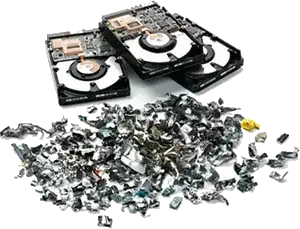I need to wipe completely the data on my hard disk so it's unrecoverable.
I'm actually using Linux, i have seen this command on the web, but I don't know if its secure.
shred -zvn 35 /dev/sdb
It depends what level of "unrecoverable" you are going for. If you want to stop a casual computer user from reading your data from a live-boot OS, then things like shred, dd, dban will do the trick.
If, however, you are worried about someone flashing the firmware of your drive, or removing the platters and putting them into a specialized data recovery machine, then software alone will not cut it. The only 100% reliable way to "make data in hard disk unrecoverable" is this:

The main reasons for this is are 1) because of disk firmware declaring a bad sector and leaving data on the disk, flagged as inaccessible. I have heard rumours that malicious HDD firmware has been know to search for sensitive-looking data on disk, and flag it as "corrupt" for future recovery by an analyst. And 2) wear leveling on SSD / flash memory drives, where the disk firmware will spread writes around the physical disk in order to prolong the lifetime of each individual sector. I have heard rumours that SSD drives ship with between 25% and 100% extra hidden space (depending on how expensive the drive was) for use by the bad sector / wear leveling algorithms. Both of these hard drive "features" mean that even if the operating system believes it has overwritten 100% of the drive volume, there may be extra copies of your data lurking in hidden areas.
For these reasons, software by itself it not enough to ensure proper erasure, you need some hardware support. Some newer (S)ATA drives provide a Secure Erase command which will reset all sectors (from Wikipedia):
"Secure erase" is a utility built into modern ATA hard drives that overwrites all data on a disk, including remapped (error) sectors.
If your hard drive supports this, and the software you use takes advantage of it, then this is probably reasonably good. However, it's not clear that all disk manufacturers implement this / implement this properly (esp. on SSD's which cut corners to prolong life).
On traditional magnetic drives, secure erasure software will probably erase your data properly, but without doing some research into your specific hard drive model, you can't be 100% sure. With SSD / flash / hybrid drives things are even less reliable due to their use of wear leveling. If you want to be properly tin-foil-hatty, then you should distrust any drive - unless you installed the firmware yourself - and either physically shred it. Additionally, using full disk encryption adds another layer of protection, but needs to be enabled from the start.
Secure cleaning of deleted files
Use dban if you are using a regular harddisk (e.g. non SSD), it can be found at http://www.dban.org/ and should make it unrecoverable.
DBAN is free erasure software designed for the home user. It automatically deletes the contents of any hard disk that it can detect. This method can help prevent identity theft before recycling a computer.